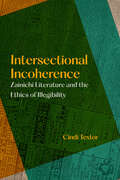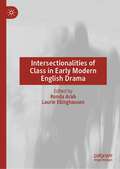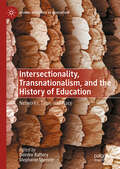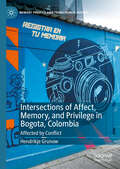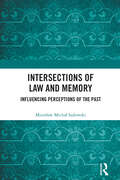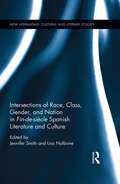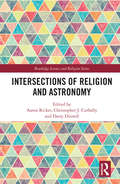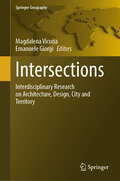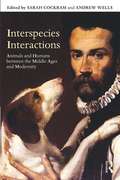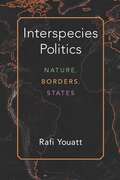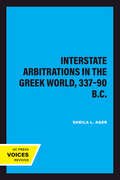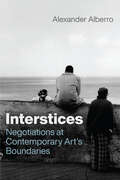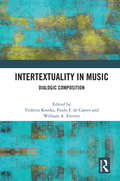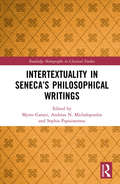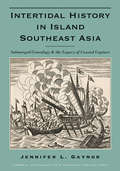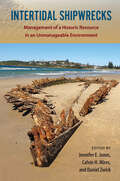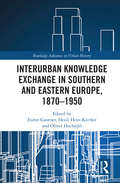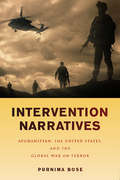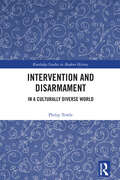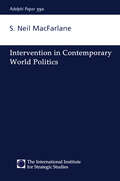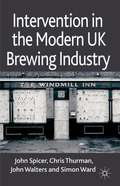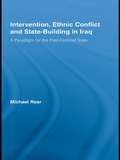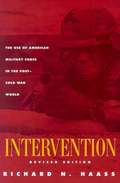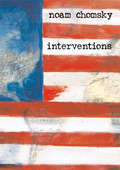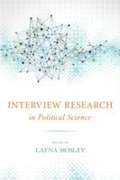- Table View
- List View
Intersectional Incoherence: Zainichi Literature and the Ethics of Illegibility (Global Korea #5)
by Cindi TextorA free ebook version of this title is available through Luminos, University of California Press's Open Access publishing program. Visit www.luminosoa.org to learn more.Intersectional Incoherence stages an encounter between the critical discourse on intersectionality and texts produced by Korean subjects of the Japanese empire and their postwar descendants in Japan, known as Zainichi Koreans. Arguing for intersectionality as a reading method rather than strictly a tool of social analysis, Cindi Textor reads moments of illegibility and incoherent language in these texts as a product of the pressures on Zainichi Koreans and their literature to represent both Korean difference from and affinity with Japan. Rejecting linguistic norms and representational imperatives of identity categories, Textor instead demands that the reader grapple with the silent, absent, illegible, or unintelligible. Engaging with the incoherent, she argues, allows for a more ethical approach to texts, subjects, and communities that resist representation within existing paradigms.
Intersectionalities of Class in Early Modern English Drama
by Laurie Ellinghausen Ronda ArabDefining class broadly as an identity categorization based on status, wealth, family, bloodlines, and occupation, Intersectionalities of Class in Early Modern English Drama e xplores class as a complicated, contingent phenomenon modified by a wider range of social categories apart from those defining terms, including, but not limited to, race, gender, religion, and sexuality. This collection of essays – featuring a range of international contributors – explores a broad range of questions about the intersectional factors influencing class status in early modern England, including how cultural behaviors and non-class social categories affected status and social mobility, in what ways hegemonies of elite prerogatives could be disrupted or entrenched by the myriad of intersectional factors that informed social identity, and how class position informed the embodied experience and expression of affect, gender, sexuality, and race as well as relationships to place, space, land, and the natural and civic worlds.
Intersectionality, Transnationalism, and the History of Education: Networks, Time, and Place (Global Histories of Education)
by Deirdre Raftery Stephanie SpencerThis volume brings together a diverse range of contributors to explore the significance of intersectionality and transnationalism, with reference to the history of education. The chapters cover a range of educational spaces and places and demonstrate the possibilities that theoretical approaches can offer to scholars at all levels of their academic career. The chapters focus specifically on women’s activism in order to maintain a coherent framework of research that is brought together in an introduction and concluding thoughts. The significance of gender as relational and a symbol of power ensures that men and masculinities are not overlooked but recognized as integral to understanding gender dynamics as they affected women’s education and the ways in which that education took place.
Intersections of Affect, Memory, and Privilege in Bogota, Colombia: Affected by Conflict (Memory Politics and Transitional Justice)
by Hendrikje GrunowThis book explores the intersections of affect, memory and privilege among Bogota’s upper middle class. Combining approaches from memory studies, anthropology, feminist and affect theory, this work is concerned with the implications for the present and potential futures contained in affective encounters. It is structured along four affects describing the social, spatial, historical and political aspects of ‘being affected’ by the Colombian conflict. After showing how the Colombian conflict is rooted in specific affective relationships to land, disappointment and crushed hopes in the context of various peace negotiations are portrayed as the central experiences nurturing a sense of a doubling or re-experiencing of past emotions. Then, a specifically upper-middle class emotional habitus and its implication for the social connections to people more directly affected by the conflict are outlined, and peace as an upper middle-class affect is revealed as a privilege not everyone deserves.
Intersections of Law and Memory: Influencing Perceptions of the Past
by Mirosław Michał SadowskiThis book elaborates a new framework for considering and understanding the relationship between law and memory.How can law influence collective memory? What are the mechanisms law employs to influence social perceptions of the past? And how successful is law in its attempts to rewrite narratives about the past? As the field of memory studies has grown, this book takes a step back from established transitional justice narratives, returning to the core sociological, philosophical and legal theoretical issues that underpin this field. The book then goes on to propose a new approach to the relationship between law and collective memory based on a conception of ‘legal institutions of memory’. It then elaborates the functioning of such institutions through a range of examples – taken from Japan, Iraq, Brazil, Portugal, Rwanda and Poland – that move from the work of international tribunals and truth commissions to more explicit memory legislation. The book concludes with a general assessment of the contemporary intersections of law and memory, and their legal institutionalisation.This book will be of interest to scholars with relevant interests in the sociology of law, legal theory and international law, as well as in sociology and politics.
Intersections of Race, Class, Gender, and Nation in Fin-de-siècle Spanish Literature and Culture (New Hispanisms: Cultural and Literary Studies)
by Jennifer Smith Lisa NalboneThis volume focuses on intersections of race, class, gender, and nation in the formation of the fin-de-siècle Spanish and Spanish colonial subject. Despite the wealth of research produced on gender, social class, race, and national identity few studies have focused on how these categories interacted, frequently operating simultaneously to reveal contexts in which dominated groups were dominating and vice versa. Such revelations call into question metanarratives about the exploitation of one group by another and bring to light interlocking systems of identity formation, and consequently oppression, that are difficult to disentangle. The authors included here study this dynamic in a variety of genres and venues, namely the essay, the novel, the short story, theater, and zarzuelas. These essays cover canonical authors such as Benito Pérez Galdós and Emilia Pardo Bazán, and understudied female authors such as Rosario de Acuña and Belén Sárraga. The authors included here study this dynamic in a variety of genres and venues, namely the essay, the novel, the short story, theater, and zarzuelas. The volume builds on recent scholarship on race, class, gender, and nation by focusing specifically on the intersections of these categories, and by studying this dynamic in popular culture, visual culture, and in the works of both canonical and lesser-known authors.
Intersections of Religion and Astronomy (Routledge Science and Religion Series)
by Aaron Ricker Chris Corbally Darry DinellThis volume examines the way in which cultural ideas about "the heavens" shape religious ideas and are shaped by them in return. Our approaches to cosmology have a profound effect on the way in which we each deal with religious questions and participate in the imaginative work of public and private world-building. Employing an interdisciplinary team of international scholars, each chapter shows how religion and cosmology interrelate and matter for real people. Historical and contemporary case studies are included to demonstrate the lived reality of a variety of faith traditions and their interactions with the cosmos. This breadth of scope allows readers to get a unique overview of how religion, science and our view of space have, and will continue to, impact our worldviews. Offering a comprehensive exploration of humanity and its relationship with cosmology, this book will be an important reference for scholars of Religion and Science, Religion and Culture, Interreligious Dialogue and Theology, as well as those interested in Science and Culture and Public Education.
Intersections: Interdisciplinary Research on Architecture, Design, City and Territory (Springer Geography)
by Emanuele Giorgi Magdalena VicuñaThis book presents a critical vision of the role of architecture and design in constantly changing cities, territories and societies from a Latin American perspective. Topics include, pandemic and post-pandemic; public culture and aesthetics; right to housing, city and services, gender approach and ethics of care; heritage and cultures, critical methodology; sustainable landscapes; perceptions and emotions; processes and technologies; territories and intermediate cities. The IV Intersections Congress was organized by high-level universities in Latin American: faculties of architecture, design and urban studies that came together during an historical moment of great changes. The congress was an invitation to weave conversations that address the tensions emerging in local, regional and global debates, with the goal of understanding how architecture, design, city and territory are a relevant intersection for these tensions. This translation was done with the help of artificial intelligence. A subsequent human revision was done primarily in terms of content.
Interspecies Interactions: Animals and Humans between the Middle Ages and Modernity
by Sarah Cockram Andrew WellsInterspecies Interactions surveys the rapidly developing field of human-animal relations from the late medieval and early modern eras through to the mid-Victorian period. By viewing animals as authentic and autonomous historical agents who had a real impact on the world around them, this book concentrates on an under-examined but crucial aspect of the human-animal relationship: interaction. Each chapter provides scholarly debate on the methods and challenges of the study of interspecies interactions, and together they offer an insight into the part that humans and animals have played in shaping each other’s lives, as well as encouraging reflection on the directions that human-animal relations may yet take. Beginning with an exploration of Samuel Pepys’ often emotional relationships with the many animals that he knew, the chapters cover a wide range of domestic, working, and wild animals and include case studies on carnival animals, cattle, dogs, horses, apes, snakes, sharks, and invertebrates. These case studies of human-animal interactions are further brought to life through visual representation, by the inclusion of over 20 images within the book. From ‘sleeve cats’ to lion fights, Interspecies Interactions encompasses a broad spectrum of relationships between humans and animals. Covering topics such as use, emotion, cognition, empire, status, and performance across several centuries and continents, it is essential reading for all students and scholars of historical animal studies.
Interspecies Politics: Nature, Borders, States (Configurations: Critical Studies Of World Politics)
by Rafi YouattThis book explores the ways that international politics is a form of interspecies politics, one that involves the interactions, ideas, and practices of multiple species, both human and nonhuman, to generate differences and create commonalities. While we frequently think of having an international politics “of” the environment, a deep and thoroughgoing anthropocentrism guides our idea of what political life can be, which prevents us from thinking about a politics “with” the environment. This anthropocentric assumption about politics drives both ecological degradation and deep forms of interhuman injustice and hierarchy. Interspecies Politics challenges that assumption, arguing that a truly ecological account of interstate life requires us to think about politics as an activity that crosses species lines. It therefore explores a postanthropocentric account of international politics, focusing on a series of cases and interspecies practices in the American borderlands, ranging from the US-Mexico border in southern Texas, to Guantánamo Bay in Cuba, to Isle Royale, near the US-Canadian border. The book draws on international relations, environmental political theory, anthropology, and animal studies, to show how key international dimensions of states—sovereignty, territory, security, rights—are better understood as forms of interspecies assemblage that both generate new forms of multispecies inclusion, and structure forms of violence and hierarchy against human and nonhuman alike.
Interstate Arbitrations in the Greek World, 337–90 B.C. (Hellenistic Culture and Society #18)
by Sheila L. AgerA great deal of information has come to light over the past several decades about the role of arbitration between the Greek states. Arbitration and mediation were, in fact, central institutions in Hellenistic public life. In this comprehensive study, Sheila Ager brings together the scattered body of literary and epigraphical sources on arbitration, together with up-to-date bibliographic references, and commentary.The sources collected here range widely; Ager presents an exhaustive record of documents ranging from the settlement of a minor territorial squabble between two tiny city-states to the resolution of major conflicts separating the great powers of the day. In addition, Ager's introduction sets the documents in historical context and outlines distinctions among categories of arbitration. The work also includes indices to literary passages, inscriptions, persons, places, subjects, and Greek and Latin terms in the documents. This collection of many previously inaccessible texts will become a primary resource for any scholar or student working in the field of Hellenistic history.
Interstices: Negotiations at Contemporary Art’s Boundaries (Abakanowicz Arts and Culture Collection)
by Alexander AlberroAn exploration of innovative practices flourishing at the margins of Western art. With this book, Alexander Alberro engages decolonial theory to explore the dynamic exchanges that occur where the ideals and values of different artistic frameworks meet. Resisting notions of a singular art world and global contemporary art, Alberro explores what lies outside of Western art’s hegemonic presence, recognizing the rich multitude of art formations at its periphery, each with its own artistic narratives and conventions. Alberro brings into focus the complex negotiations that are cultivating innovation and transformation at the margins of Western art, showing how this seemingly monolithic framework is both crucial to and insufficient for a comprehensive understanding of contemporary art. His examples include artists and collectives from around the world, including Iosu Aramburu, Subhankar Banerjee, Yto Barrada, Mabe Bethônico, El Colectivo, Maria Galindo and Mujeres Creando, Bouchra Khalili, Multiplicity, Lucy Orta, Raqs Media Collective, Tracey Rose, Doris Salcedo, Yinka Shonibare, World of Matter, and Yin Xiuzhen. As notions of transculturation and decoloniality continue to drive conversations about contemporary art, Interstices offers a critical explanation of what is at stake, showing how the tensions at the edges of the Western art framework are pushing it toward its discursive limits.
Intertextuality in Music: Dialogic Composition
by Violetta KostkaThe concept of intertextuality – namely, the meaning generated by interrelations between different texts – was coined in the 1960s among literary theorists and has been widely applied since then to many other disciplines, including music. Intertextuality in Music: Dialogic Composition provides a systematic investigation of musical intertextuality not only as a general principle of musical creativity but also as a diverse set of devices and techniques that have been consciously developed and applied by many composers in the pursuit of various artistic and aesthetic goals. Intertextual techniques, as this collection reveals, have borne a wide range of results, such as parody, paraphrase, collage and dialogues with and between the past and present. In the age of sampling and remix culture, the very notion of intertextuality seems to have gained increased momentum and visibility, even though the principle of creating new music on the basis of pre-existing music has a long history both inside and outside the Western tradition. The book provides a general survey of musical intertextuality, with a special focus on music from the second half of the twentieth century, but also including examples ranging from the nineteenth century to the second decade of the twenty-first century. The volume is intended to inspire and stimulate new work in intertextual studies in music.
Intertextuality in Seneca’s Philosophical Writings (Routledge Monographs in Classical Studies)
by Garani Myrto Michalopoulos Andreas N. Sophia PapaioannouThis volume is the first systematic study of Seneca’s interaction with earlier literature of a variety of genres and traditions. It examines this interaction and engagement in his prose works, offering interpretative readings that are at once groundbreaking and stimulating to further study. Focusing on the Dialogues, the Naturales quaestiones, and the Moral Epistles, the volume includes multi- perspectival studies of Seneca’s interaction with all the great Latin epics (Lucretius, Vergil and Ovid), and discussions of how Seneca’s philosophical thought is informed by Hellenistic doxography, forensic rhetoric and declamation, the Homeric tradition, Euripidean tragedy and Greco-Roman mythology. The studies analyzes the philosophy behind Seneca’s incorporating exact quotations from earlier tradition (including his criteria of selectivity) and Seneca’s interaction with ideas, trends and techniques from different sources, in order to elucidate his philosophical ideas and underscore his original contribution to the discussion of established philosophical traditions. They also provide a fresh interpretation of moral issues with particular application to the Roman worldview as fashioned by the mos maiorum. The volume, finally, features detailed discussion of the ways in which Seneca, the author of philosophical prose, puts forward his stance towards poetics and figures himself as a poet. Intertextuality in Seneca’s Philosophical Writings will be of interest not only to those working on Seneca’s philosophical works, but also to anyone working on Latin literature and intertextuality in the ancient world.
Intertidal History in Island Southeast Asia: Submerged Genealogy and the Legacy of Coastal Capture
by Jennifer L. GaynorIntertidal History in Island Southeast Asia shows the vital part maritime Southeast Asians played in struggles against domination of the seventeenth-century spice trade by local and European rivals. Looking beyond the narrative of competing mercantile empires, it draws on European and Southeast Asian sources to illustrate Sama sea people's alliances and intermarriage with the sultanate of Makassar and the Bugis realm of Boné. Contrasting with later portrayals of the Sama as stateless pirates and sea gypsies, this history of shifting political and interethnic ties among the people of Sulawesi’s littorals and its land-based realms, along with their shared interests on distant coasts, exemplifies how regional maritime dynamics interacted with social and political worlds above the high-water mark.
Intertidal Shipwrecks: Management of a Historic Resource in an Unmanageable Environment (Society and Ecology in Island and Coastal Archaeology)
by Jennifer E. Jones Calvin H. Mires Daniel ZwickA global array of case studies demonstrating practices for preserving the maritime cultural heritage of vulnerable shipwrecks Shipwreck sites in intertidal zones—the parts of shorelines that are exposed at low tide and covered at high tide—are located within dynamic environments. Periodically uncovered and reburied, these stranded vessels are affected by surf and currents that accelerate the decay of their remains, and their materials are often salvaged. This volume presents 17 case studies from 9 countries on the management of intertidal shipwrecks and strategies for conservation, archaeological research, and public outreach focused on such sites.These case studies explore topics such as legislation protecting shipwrecks along the Pacific coast of New Zealand, the ways wreck sites in Germany’s North Sea coastline are safeguarded and studied, local community participation in the preservation of shipwrecks along the Patagonian Atlantic coast, and the effects of climate change on sites along the Potomac River in Maryland. Pioneering intertidal resource managers discuss innovative strategies for preventing damage to ships and losses to local maritime heritage. The first volume to examine these sites at varying scales across the globe, Intertidal Shipwrecks is an important resource as climate impacts increase and the role of citizen science programs becomes more significant. A volume in the series Society and Ecology in Island and Coastal Archaeology, edited by Victor D. Thompson and Scott M. FitzpatrickContributors: Edward Pollard | Jose Manuel Mates Luque | Bev Parslow | Susan B.M. Langley | Karl Brady | Monica Grosso | Linda Shine | Hefin Meara | Guillermo Gutiérrez | Christian Murray | James P. Delgado | Mark Harrison | Anthony Corn | Sandra Henry | Athena Trakadas | Nathan Richards | Carlo Beltrame | Maria Paula Bunicontro | Stephen B. Atkinson | Kurt Bennett | Stefan Claesson | Brad Duncan | Taylor Picard | Andy Sherman | Amy A. Borgens | Chuck Meide | Mariam Pousa
Interurban Knowledge Exchange in Southern and Eastern Europe, 1870–1950 (Routledge Advances in Urban History)
by Heidi Hein-Kircher Oliver Hochadel Eszter GantnerAround 1900 cities in Southern and Eastern Europe were persistently labeled "backward" and "delayed." Allegedly, they had no alternative but to follow the role model of the metropolises, of London, Paris or Vienna. This edited volume fundamentally questions this assumption. It shows that cities as diverse as Barcelona, Berdyansk, Budapest, Lviv, Milan, Moscow, Prague, Warsaw and Zagreb pursued their own agendas of modernization. In order to solve their pressing problems with respect to urban planning and public health, they searched for best practices abroad. The solutions they gleaned from other cities were eclectic to fit the specific needs of a given urban space and were thus often innovative. This applied urban knowledge was generated through interurban networks and multi-directional exchanges. Yet in the period around 1900, this transnational municipalism often clashed with the forging of urban and national identities, highlighting the tensions between the universal and the local. This interurban perspective helps to overcome nationalist perspectives in historiography as well as outdated notions of "center and periphery." This volume will appeal to scholars from a large number of disciplines, including urban historians, historians of Eastern and Southern Europe, historians of science and medicine, and scholars interested in transnational connections.
Intervention Narratives: Afghanistan, the United States, and the Global War on Terror (War Culture)
by Purnima BoseIntervention Narratives examines the contradictory cultural representations of the US intervention in Afghanistan that help to justify an imperial foreign policy. These narratives involve projecting Afghans as brave anti-communist warriors who suffered the consequences of American disengagement with the region following the end of the Cold War, as victimized women who can be empowered through enterprise, as innocent dogs who need to be saved by US soldiers, and as terrorists who deserve punishment for 9/11. Given that much of public political life now involves affect rather than knowledge, feelings rather than facts, familiar recurring tropes of heroism, terrorism, entrepreneurship, and canine love make the war easier to comprehend and elicit sympathy for US military forces. An indictment of US policy, Bose demonstrates that contemporary imperialism operates on an ideologically diverse cultural terrain to enlist support for the war across the political spectrum.
Intervention and Disarmament: In a Culturally Diverse World (Routledge Studies in Modern History)
by Philip TowleIn this book, some of Philip Towle’s major contributions are brought together to shed light on the Cold War and its aftermath. Topics include the build-up of chemical and nuclear weapons, the attack on New York’s World Trade Center in 2001, intervention in overseas conflicts, and the role of the Church. The first section concentrates on the ways in which the West has interfered in conflicts around the world from the Vietnam War to Bosnia, Afghanistan, and Iraq, and explains why intervention worked in former Yugoslavia but not in countries such as Vietnam, Afghanistan, or Libya. The second section focuses on arms control and disarmament, how they were linked to intervention – particularly through the fear of terrorism – and how and why some arms control measures succeeded, and some did not. Intervention and Disarmament: In a Culturally Diverse World is useful for postgraduates and scholars interested in international affairs and warfare in the modern world.
Intervention in Contemporary World Politics: Intervention In Contemporary World Politics (Adelphi series)
by Neil MacfarlaneExamines multilateral interventions in civil conflicts and the evolution of the role of such interventions in world politics. It focuses primarily on the Cold War and post-Cold War eras and the differences between them. It contests the notion that there is an emerging norm of humanitarian intervention in international politics, arguing that political interests remain essential to the practice of intervention.
Intervention in the Modern UK Brewing Industry
by Chris Thurman John Spicer John Walters Simon WardThis is the story of the radical intervention carried out by the Thatcher administration in response to 1986-89 Monopolies and Mergers Commission inquiry into brewing. It describes the creation of big brewers, the official investigations into what many saw as an uncompetitive structure and the damaging consequences for consumers and licensees.
Intervention, Ethnic Conflict and State-Building in Iraq: A Paradigm for the Post-Colonial State (Studies in International Relations)
by Michael RearExternal intervention by the U.N. and other actors in ethnic conflicts has interfered with the state-building process in post-colonial states. Rear examines the 1991 uprisings in Iraq and demonstrates how this intervention has contributed to the problems with democratization experienced in the post-Saddam era. This timely work will appeal to scholars of International Relations and Middle East studies, as well as those seeking greater insight into the current conflict in Iraq.
Intervention: The Use of American Military Force in the Post-Cold War World
by Richard N. HaassFirst published in 1994, this volume addresses the debate over US intervention around the world, including recent cases, the politics of force, learning from history, the future of intervention. An afterword addresses the use of force by the US since 1994. Appendices present relevant documents and remarks by such figures as Caspar Weinberger, Colin Powell, and Bill Clinton.
Interventions
by Noam ChomskyInterventions by Noam Chomsky is getting new press after the Pentagon banned the book from Guantanamo Bay's prison library. The Miami Herald broke the story on October 11, 2009 and stories followed in The Washington Independent, the Boston Herald, and other outlets. Democracy Now! picked up the story on October 13: "Published in 2007, Interventions compiles a series of Chomsky's columns. The Pentagon has refused to explain why the book has been barred.""Chomsky is a global phenomenon . . . perhaps the most widely read voice on foreign policy on the planet."--The New York Times Book ReviewInterventions is Noam Chomsky at his best.Not since his all-time best-selling title, 9/11, published in the Open Media series in 2001, have readers had a timely, short, easy-to-read, affordable Chomsky. Unlike 9/11, Interventions is a writerly work--a series of more than thirty tightly argued essays aimed at various aspects of US power and politics in the post-9/11 world. While critical of US military interventions around the globe, each piece in the book is in itself an intellectual intervention aimed at raising public ire about the consequences of US use of power at home and abroad.Interventions' subjects span from 9/11 and the Iraq war to Social Security and Intelligent Design, South America and Asia, the Israeli occupation of Palestine and the election of Hamas, Hurricane Katrina, and the US concept of "just war."According to BusinessWeek, "With relentless logic, Chomsky bids us to listen closely to what our leaders tell us--and to discern what they are leaving out. . . . Agree with him or not, we lose out by not listening." Chomsky's Interventions delivers what readers want: an accessible set of skeleton keys for opening up a wide range of global issues dominating today's political landscape.Noam Chomsky is the critically acclaimed author of many books, including Hegemony or Survival, Imperial Ambitions, Failed States, Manufacturing Consent, and Media Control.
Interview Research In Political Science
by Layna MosleyInterviews are a frequent and important part of empirical research in political science, but graduate programs rarely offer discipline-specific training in selecting interviewees, conducting interviews, and using the data thus collected. Interview Research in Political Science addresses this vital need, offering hard-won advice for both graduate students and faculty members. The contributors to this book have worked in a variety of field locations and settings and have interviewed a wide array of informants, from government officials to members of rebel movements and victims of wartime violence, from lobbyists and corporate executives to workers and trade unionists. The authors encourage scholars from all subfields of political science to use interviews in their research, and they provide a set of lessons and tools for doing so. The book addresses how to construct a sample of interviewees; how to collect and report interview data; and how to address ethical considerations and the Institutional Review Board process. Other chapters discuss how to link interview-based evidence with causal claims; how to use proxy interviews or an interpreter to improve access; and how to structure interview questions. A useful appendix contains examples of consent documents, semistructured interview prompts, and interview protocols. Contributors: Frank R. Baumgartner, The University of North Carolina at Chapel Hill; Matthew N. Beckmann, University of California, Irvine; Jeffrey M. Berry, Tufts University; Erik Bleich, Middlebury College; Sarah M. Brooks, The Ohio State University; Melani Cammett, Brown University; Lee Ann Fujii, University of Toronto; Mary Gallagher, University of Michigan; Richard L. Hall, University of Michigan; Marie Hojnacki, Pennsylvania State University; David C. Kimball, University of Missouri, St. Louis; Beth L. Leech, Rutgers, the State University of New Jersey; Julia F. Lynch, University of Pennsylvania; Cathie Jo Martin, Boston University; Lauren Maclean, Indiana University; Layna Mosley, The University of North Carolina at Chapel Hill; Robert Pekkanen, University of Washington; William Reno, Northwestern University; Reuel R. Rogers, Northwestern University
